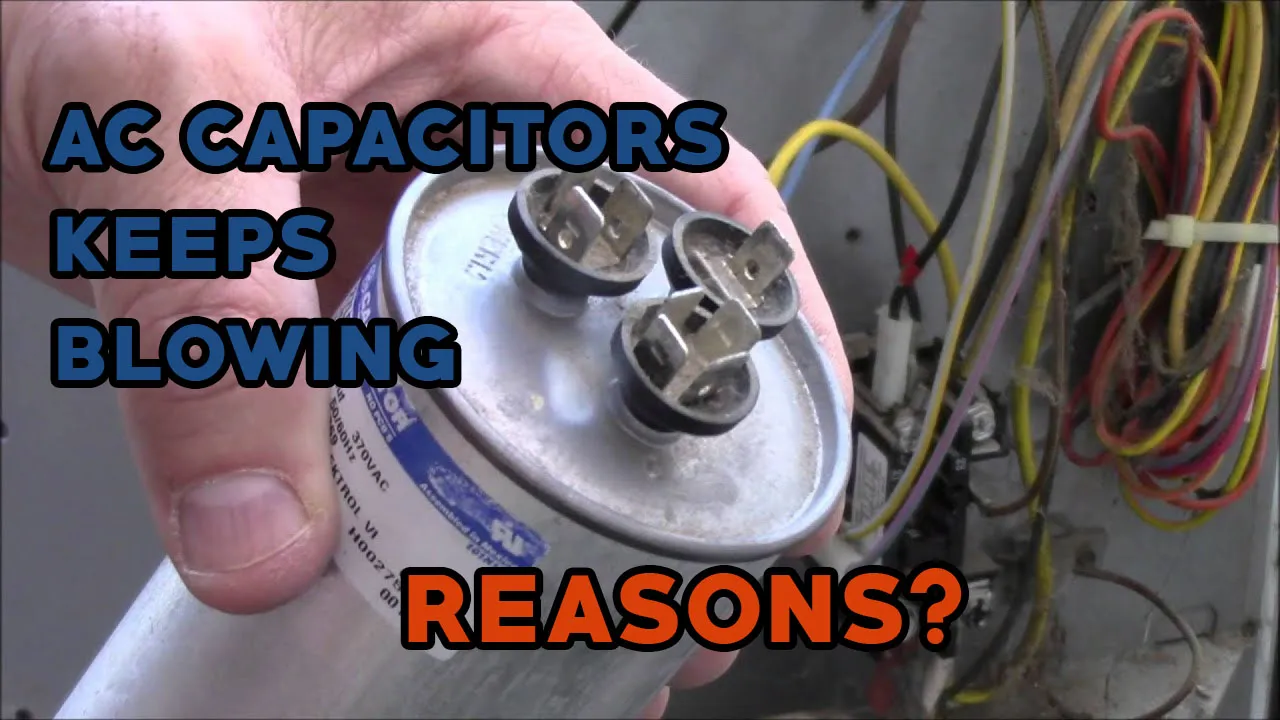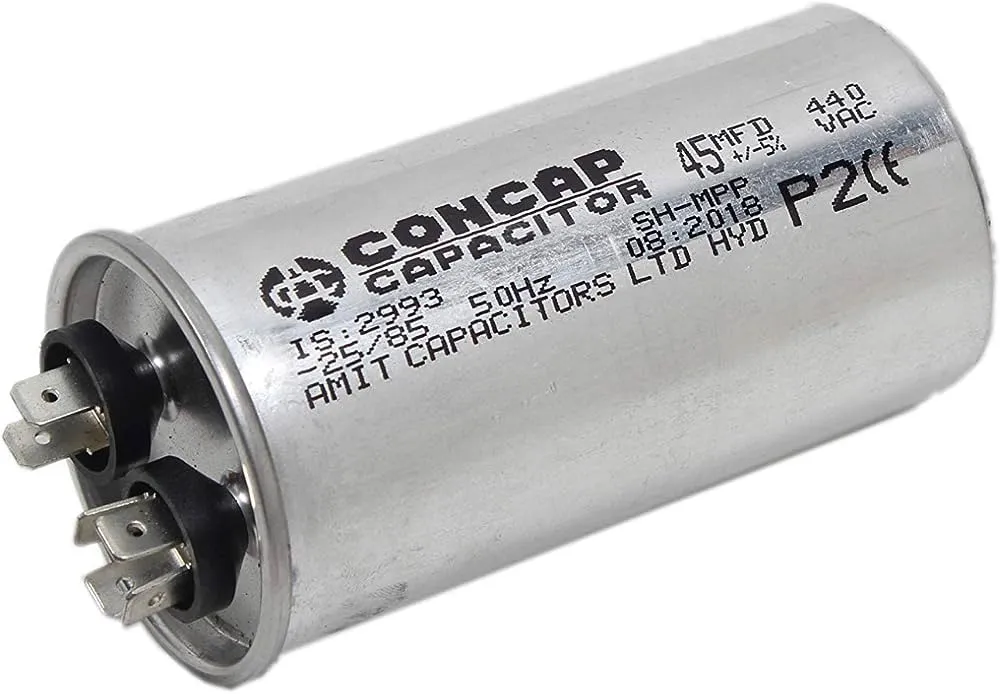AC Capacitor Keeps Blowing: What to Do Next?

AC Capacitor Keeps Blowing
AC Capacitor Keeps Blowing can be incredibly frustrating and cost-prohibitive if you're dealing with a recurring issue with your air conditioner. The capacitor plays an important role in starting and operating the motors of AC units. You may experience frequent system failures, discomfort at home, and higher utility bills if it fails repeatedly.
An AC capacitor that has blown may have a variety of causes, which can be detected and resolved. Your air conditioning system will operate efficiently and reliably when you understand the underlying factors and take appropriate action.
What is an AC Capacitor?

“The AC capacitor, or alternating current capacitor, plays an essential role in electrical and electronic devices that operate on alternating current. In order for the equipment to function properly, it stores and releases electrical energy.”
Electrical circuits benefit from AC capacitors by improving their power factor. It is necessary to have reactive power in a device's power factor in order to measure its energy efficiency. In AC circuits, reactive power occurs because voltage and current are phase-different. Reactive power can be stored and released by a capacitor, thereby increasing the power factor.
Common Reason of AC Capacitor Keeps Blowing
Capacitors are subject to wear and tear due to their tough job. ACs often need more repairs due to their capacitors failing than other parts. A capacitor's failure is most commonly caused by the following factors.
Damaged Parts
In order to prevent overheating, capacitors must be cooled every couple of seconds. It can cause the capacitor to overheat, however, if the fan motor or compressor drags due to wear or damage. Overheating can also occur when a relay switch fails, causing the capacitor to run too long.
Overheat
Air conditioning units usually have capacitors deep inside their bodies since they are heat-sensitive. Heat can affect their capacity to hold a charge, which reduces their efficiency. As a result, their life spans can be reduced and they may fail sooner than expected. This usually means replacing your capacitor, as recommended by technicians. Shade your AC unit to avoid heat exposure. You should also replace the filter on a regular basis to prevent hot air from getting trapped.
Electrical Overload
Around three-quarters of the fan motor and compressor are powered by an AC capacitor. Once it has run for a short period of time, it will disengage. An electrical overload can destroy the capacitor if the motor is physically blocked. Other power surges and lightning strikes can also damage capacitors.
Wrong Voltage Rating
There are many different shapes and sizes of AC capacitors. The new capacitor should match the old capacitor's specifications when you complete any type of heating or air conditioning repair. The capacitors may be replaced on their own by inexperienced technicians and some individuals.
Additionally, a malfunctioning capacitor can result from this. Capacitors are not capable of doing much more than they are expected to do. Your AC unit may not be damaged or harmed by an undersized capacitor. Capacitors aren't capable of handling much more than they are expected to. Your heater or air conditioner will need another repair within a short time as a result.
Old Capacitor
The shelf life of a capacitor is the same as that of everything else in life. The average AC capacitor lasts about 20 years. Most heat and air conditioning repair companies examine the capacitor last because it has such a long lifespan. Capacitors are expected to last for many years. Capacitors may wear out faster due to some variables. Because the capacitor is doing more work with a more frequent cycle, it will wear out much faster.
Short Circuits
When two points of low resistance are unintentionally connected, a short circuit can blow a capacitor. Electrical short circuits can cause excessive current flow through capacitors, causing them to fail due to an overflow of current.
Signs of a Faulty AC Capacitor
If your AC Capacitor Keeps Blowing, then there are a lot of faulty signs of Capacitor of your AC which you can see. Some of the signs are given below:
Humming Noise
It is possible to hear a humming or buzzing noise coming from a faulty capacitor. Electric arcs or trouble starting the capacitor are often responsible for this noise.
AC Not Work at All
Your AC system may not work because of a faulty capacitor if it won't turn on or doesn't work at all. In order for the AC unit to start, the capacitor must be charged. The AC system may not receive the necessary electrical boost if this is not done.
Shuts Down Randomly
The AC system may shut down unexpectedly due to a faulty capacitor. In either case, you will be left with an uncomfortable indoor atmosphere as the cooling process is disrupted. An underlying cause of your AC system shutting down randomly is a faulty capacitor, and may need to be inspected for diagnosis.
Slow Cooling Cycle
Slow cooling cycles can be caused by a malfunctioning capacitor. When your AC system fails to cool the space adequately, it may take longer to reach the desired temperature. An inefficient capacitor indicates a possible fault, which should be addressed.
Burning Smell
A faulty capacitor could cause your AC unit to emit smoke or smell burning. Smoke or a burning smell can be caused by overheating or internal damage to the capacitor. For the sake of preventing future damage or potential hazards, this issue must be addressed immediately.
Higher Bills
The energy efficiency of an AC system can be negatively impacted by a faulty capacitor. In order to achieve the desired cooling effect, a malfunctioning capacitor increases the cost of energy. Having a faulty capacitor could be a contributing factor to a sudden increase in your energy bills.
Faqs
Question 1: When a capacitor blows, will the AC still run?
Answer: Damaged or corrosion capacitors can no longer function properly over time. It's not a good idea to use your HVAC system until you've replaced your AC capacitors.
Question 2: Is it possible to replace my AC unit's capacitor with a bigger one?
Answer: If you are not advised by a professional technician, you should not increase the capacitor in your AC unit. In order to prevent potential damage to the system, the capacitor size should match the manufacturer's specifications.
Question 3: What is the best time to replace an AC capacitor?
Answer: AC capacitors should be replaced when damaged or physically deformed, or if they fail to perform at their specified voltage and capacitance. As a preventive measure, it is also common to replace the capacitor when other components in the system are being replaced.
Question 4: Is there a smell coming from a bad AC capacitor?
Answer: The internal components of an AC capacitor can overheat or experience damage, causing a burning smell or smoke to be released. For further damage to be prevented or any potential hazards to be reduced, address any such odors as soon as possible.
Final Verdict
Overvoltage, exceeding the capacitor's rated ripple current, is the most common cause of field failures. A professional should be consulted if you notice any signs of failure. Moreover, you can read the causes given above in the AC Capacitor Keeps Blowing article, which will help you to understand the signs of failure.
Related Articles
How Long Do Electrolytic Capacitors Last
How to Charge Capacitor Without Resistor?
How to Install a Capacitor to Two Amps
How to Test a Hard Start Capacitor [Complete Guide]










